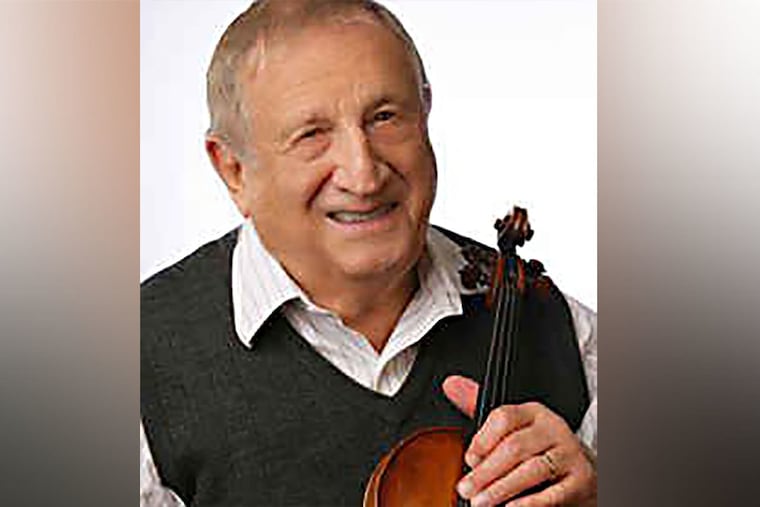Jerome Wigler, violinist with the Philadelphia Orchestra, dies at 101
Over six decades, he became a familiar face smiling back at audiences from the violin section. "He loved what he did,” said an orchestra colleague.

Jerome Wigler, 101, a violinist and the longest-serving musician in the Philadelphia Orchestra’s history, died Wednesday, July 21, at his home in Foothill Ranch, Calif.
In Mr. Wigler’s long career — the 60 years he played with the Philadelphia Orchestra wasn’t even all of it — he won the esteem of colleagues, critics, and audiences alike. He played for maestros like Arturo Toscanini, Eugene Ormandy, Igor Stravinsky, Wolfgang Sawallisch, Sergei Rachmaninoff, and others, as well as luminaries like Frank Sinatra and Nat King Cole.
He was a war hero, and he fought for his fellow musicians as a labor leader. He lived with the psychic scars he sustained helping to save lives on the bloody battlefields of Europe in World War II, but his loved ones knew him as a man of joy.
“In the many years I knew him, there was just this joy in making music. He just loved the violin so much,” said Davyd Booth, who plays violin and keyboard with the Philadelphia Orchestra. “It was pretty amazing he was able to do it as long as he was and as well as he was able to. He was really a remarkable guy.”
Mr. Wigler was born in Detroit to Russian immigrants Max and Sarah Wigler. He had four siblings, Freda, Sidney, Lorraine, and Bernard, all deceased.
The violinist gave his first concert at age 10 with the Detroit Symphony, and he was an active recitalist before he moved to New York to attend the prestigious Juilliard School of Music. He graduated in 1941 with a degree in violin performance.
Mr. Wigler was hired by the Minneapolis Symphony, but was soon drafted into the Army. He served as a medic on the front lines during the Battle of the Bulge, tended the D-Day wounded at Normandy, and helped save lives at other locations, too. He also played for the troops. He came home with a Purple Heart and two Bronze Stars. It was only years later that he could be candid about his enduring memories of the war.
While stationed in Belgium, Mr. Wigler met his wife, Gabrielle Verdin, a talented artist. The couple ultimately settled in Swarthmore and had two sons, Paul Frederick Wigler and Marc Emile Wigler.
After the war, Mr. Wigler returned to perform with the Minneapolis Symphony. He went on to join the NBC Orchestra and became first chair with the Center Theatre. He turned down a position with the New York Philharmonic, whose season lasted only six months a year; he said he couldn’t afford to take the job.
In 1951, he joined the Philadelphia Orchestra as second violin.
Mr. Wigler would become the orchestra’s longest-serving member, not retiring until 2011.
“Such was Jerry’s longtime membership in the Philadelphia Orchestra that many people would only have known the ensemble with his familiar face smiling back from the violin section,” orchestra spokesperson Ashley Berke said. “His was an integral part of the famous Philadelphia Sound and an institution within an institution.”
Paul Wigler said his father would want to be remembered for his talent, but also for his labor activism and efforts to better the lives of his orchestra colleagues, standing up to management and even the maestros.
“And he had a wicked sense of humor,” said his son. ”My favorite story was the one about how Eugene Ormandy interrupted a rehearsal to single out my dad with ‘Wigler! You made a mistake!,’ to which he replied, ‘Mr. Ormandy, you make more mistakes in one day than I make in a year!’ He was sent to the last seat in the section for that, but had the last laugh as he still got his first-chair bonus.”
Mr. Wigler was a teacher, too. He helped found the Delaware County Youth Orchestra. His students have won the Philadelphia Orchestra’s Albert M. Greenfield Student Competition, as well as numerous other competitions, and have performed as soloists with the orchestra.
Mr. Wigler is survived by his sons, two grandchildren, and other relatives. His wife died before him.
Members of the Philadelphia Orchestra are planning a remembrance for the fall. The details will be announced later.
Memorial gifts in Mr. Wigler’s honor may be made to the Philadelphia Orchestra Annual Fund Office, 1 South Broad St., 14th Floor, Philadelphia, Pa. 19107 or online at development@philorch.org